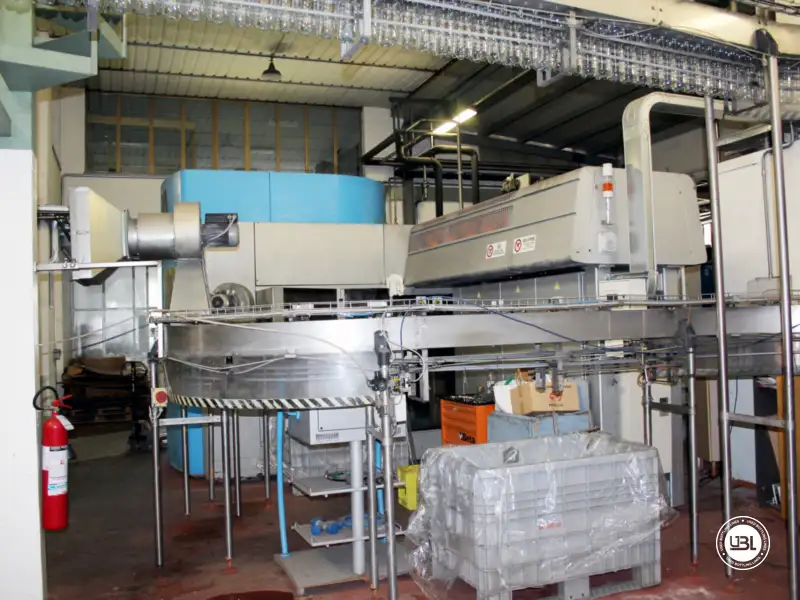Description
Used Complete Bottling Line PET Sipa – 12,000 Bottles per hour
This used bottling line is dated but very functional and still does its job well. It reaches a speed of 12 000 bottles/hour; depending on the format worked, including 0.50 L; 1 L; 1.5.
The machine works with PET bottles and produces both still and sparkling water.
Blower
Manufactured by Sipa, the Sfr12 2000 model range SFR is reliable and easy to use: the rotary blow molding machine SIPA SFR guarantees the industrial production of high-quality containers to the highest production rates available on the market.
The preforms are unloaded in bulk into the preform hopper and are then transported by an elevator belt, the speed of which is controlled by the electronics of the machine. Then they are loaded into the transportation chain to be sent to the ovens by means of a mechanical star wheel. Two major preform quality checks are made before the preforms enter the oven.
The preform is carried through the oven with the neck down while being heated with standard infrared lamps. Each oven module and each lamp can be adjusted with regard to position and power, thus assuring the maximum process setting flexibility.
The blown bottles are removed from the molds and sent to the ejection guides by means of a wheel and a series of mechanically synchronized pincers.
Consumption: 239 kW; 400 V; 220 A; 50 Hz
Filling Monoblock Sarcmi
This used filling monoblock has been well maintained despite its age, that is, it was manufactured in 1994. It is a Sarcmi product model Bluestar 2R.
This used filling monoblock consists of a 40 valve internal bottle rinsing machine, followed by an isobaric filler with 60 taps, and finally an 8-head capper. Safety protections are all present and also any machinery manuals. The bottled product from this line is purely still water and sparkling water in sizes of 0.50 L; 1 L; 1,5 L.
The type of filling is isobaric with mobile nozzles and traditional valves. It generates a vacuum before capping.
Labeller
This used bottling line for sale, follows a Simonazzi branded labeller also from 1994
The machine is designed to work in several bottle formats, in PET. The formats are as follows: 0.50 L; 1 L; 1.5 L. At the moment the machine is still in production, so it is fully functional.
It’s speed can go up to 12,000 bottles per hour. The labeller has some spare parts available.
The modular system of the labeller allows you to use only those necessary for glue, adhesive or mixing with one another. The mechanical trolley that supports the station has a quick release system, connected via an electrical socket to the central PLC, from which it receives the recipes stored for the adhesive labels.
The glue units are equipped with anti-solid systems to always keep the glue hot and avoid blockages in the glue loading system on the central distribution roller.
At the exit of the labeller we can see a 2012 laser encoder still kept like new; make Markem, model SLC 150 10W.
Inspector
The inspector in this used bottling line is from the GF digital model Inspect 5000, from 1994 but still working; able to control the level of the bottles even at high speeds.
The conveyor belts from Simonazzi are all from 1994 like most of the components of this machine.
Shrink wrapper
SMI shrink wrapper of model APET 132 C which, by means of a heat-shrinkable system, wraps the bottles firmly before moving on to the application of the handle; a task that belongs to the Berchi model MDE-L handle applicator, also from 1994.
Palletizer
There is a Berchi palletizer at the end of this used bottling line after the Simonazzi pallet wrapper, that completes the production cycle. It is rotating arm with pallet storage and interlayer remover.
There are several compressors attached to this machine branded SIAD from 1994 and 2004 respectively, all working, covered from bad weather. The EVAPCO 1994 wildcard model chiller is the latest component of this line in perfect working order.
Some spare parts are available for each machine in the line. The last revision carried out dates back to a year ago.
To be disassembled in January/February 2022.

